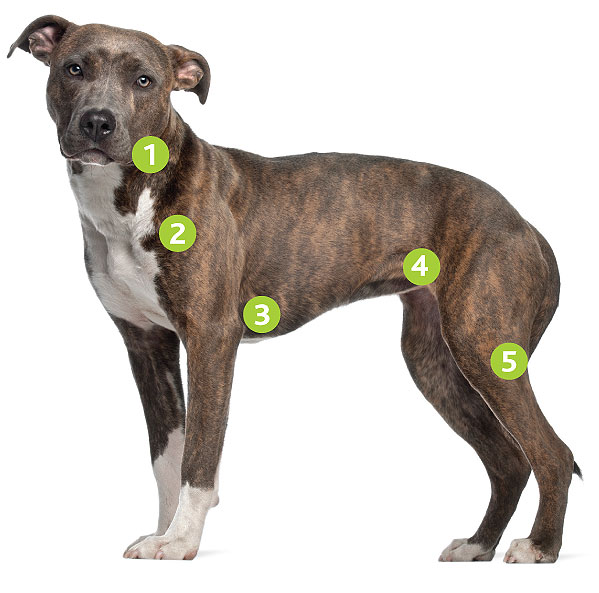
Lymphoma of the skin tissue is usually the most obvious to diagnose as it can sometimes be seen and felt as red lumps on the skin. Here are the diagnostic procedures treatment options symptoms causes and conditions for euthanasia you need to know about lymphoma.

Here are the diagnostic procedures treatment options symptoms causes and conditions for euthanasia you need to know about lymphoma.
How do you know if your dog has lymphoma. Early detection and treatment of lymphoma can extend a dogs life or cause the cancer to go into either partial or complete remission for a period of time. A partial remission means that the cancer has been reduced by at least 50 percent. Complete remission is when the cancer becomes undetectable in a.
If your dog has many uncomfortable symptoms associated with their canine lymphoma such as diarrhea vomiting and no energy and the cancer has also become painful you might want to start thinking of euthanasia. If your dogs quality of life has dwindled to. Most of the dogs will have a diagnosis from the lymph nodes that have enlarged.
More dog lymphoma symptoms include polyuria and lethargy. When the pet owner needs proper diagnosis they will be requested to come with a detailed report of the dogs history. You will know when its time to let her go she will look at you a certain way and shes letting you know she is ready.
Listen to her it will be hard on you but its best for the dog. Believe me I know how hard it is but we have to put our own feelings aside and do whats best for them. They are counting on you and you have to do what you have to do.
Canine Lymphoma is a disease that attacks your dogs lymphocytes which are white blood cells that coexist with the immune system to keep dogs away from infection. Here are the diagnostic procedures treatment options symptoms causes and conditions for euthanasia you need to know about lymphoma. You must consult with your veterinarian beforehand when considering euthanizing a dog with lymphoma.
In some cases the vet may be able to definitively determine when to euthanize your canine but in other cases it may fall upon you to make the decision based on the observation you make of your pets attitude and behavior. I have an 11yr old dashundbeagle that was diagnosed with lymphomaIts been a month and his lympnodes have gotten biggerHes on steriods and antibiotics and hes getting worseHes had great days but hes starting to have breathing troublesconstantly panting from the steroidsweak and lethargicHe still eats wellgoes to the bathroom well and is still by your sideIt very hard to put him downI see a loving dog but i also see a sick dog and hes just not a dog. If your dog has Stage 1 lymphoma only a single lymph node appears to be involved.
Stage 2 involves several nodesin stage 3 all lymph nodes are affected. Stage 4 includes spleen chest and liver involvement. In Stage 5 the disease has spread to the bone marrow.
Lymphoma of the skin tissue is usually the most obvious to diagnose as it can sometimes be seen and felt as red lumps on the skin. This is rare but lymphoma can actually affect any part of your dogs lymph tissue. Bones liver mouth eyes.
Sadly this illness doesnt take prisoners. Lets look at some numbers. Typically a dog with lymphoma lives only one 1 month without treatment.
The median survival time with a multi-agent chemotherapy protocol is 13 to 14 months. So if your dog has lymphoma and you dont treat with chemo you would expect to have one month more with your dog. Commonly the first symptoms of lymphoma include swollen lymph nodes glands and excessive drinkingpeeing.
Treatment is available to extend the life of a dog with lymphoma but sadly the condition is eventually always fatal. Contact your vet if you notice your dog has big lymph nodes. If your dog is spending lots of time gazing at you with adoration snuggling into your lap or doing his best to request a belly rub given his limited movements you might see that as a warning sign.
Get the Dog Cancer Survival Guide to read more on End of Life and Hospice Care in Chapter 25. We are able to take samples which diagnose lymphoma using special techniques which can identify which of the many types of lymphoma your dog has. With our experience in treating lymphoma we can choose a bespoke treatment protocol which we hope will be the right match for you and your dog.
The treatments can be given here or we can work in. How Do I Know When to Euthanize a Dog With Cancer. Both early- and late-stage cancers require diligent monitoring.
Pay close attention to changes in your dogs behavior and routine. Dogs cant tell us how they are feeling so these sometimes subtle changes can help you evaluate your pets pain and overall well-being. The following are some simple steps you can take to help ensure the best possible outcome when dealing with a canine lymphoma diagnosis.
Talk with your veterinarian. First and foremost stay in close communication with your veterinarian andor veterinary oncology specialist. So sorry to hear that.
Hope youre doing okay. At work veterinary hospital we go with the when the bad days outnumber the good approach generally. Some people hang on too long because their dog has 6 bad days then suddenly have one good day and they see it as improvement - which is understandable when its your pet and you love them.